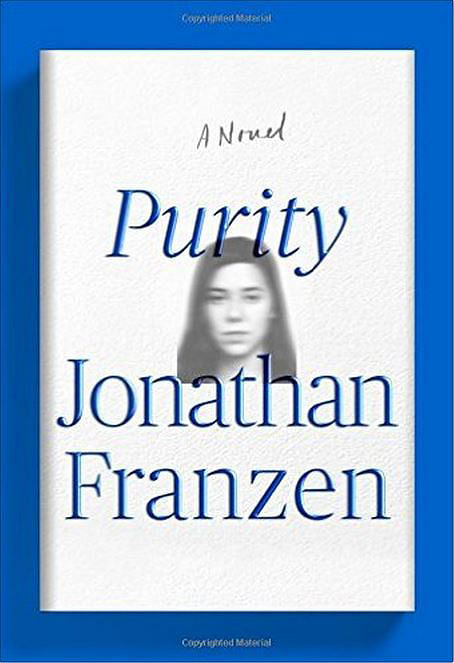FICTION
PURITY
By Jonathan Franzen
Fourth Estate/Hardcover/
563 pages/$28.89
Ratings: 2.5/5
The problem with purity is that, while it is worth aspiring to, it remains an impossibility.
At least that is one possible conclusion one can draw from reading Jonathan Franzen's latest saga of familial dysfunction, named both for the quality of driven snow and for the novel's heroine.
Purity "Pip" Tyler, resident of Oakland, has a dead-end job as a glorified telemarketer, a pile of student debts and a mother who requires constant communication and reassurance.
Sexually promiscuous, yet carrying a chaste torch for a married roommate, Pip finally cracks under unrequited passion and high-tails it to Bolivia to take up a paid internship that sounds too good to be true.

Working for the WikiLeaks- esque Sunlight Project, under the charismatic Andreas Wolf, who rose to prominence as a truth-teller and activist with the fall of the Stasi and the Berlin Wall, she finds herself drawn into mind games and cyber-espionage that threaten to swallow her being and scramble her moral compass.
Told in seven parts, from the perspective of four different characters, the book leap-frogs from America to East Germany, and back again, zipping back and forth in time. The narrative unfolds and re-unfolds from different angles, advancing incrementally, revealing new secrets as it goes along.
Along the way, on Pip's journey towards self-discovery and reward a la a modern-day version of Charles Dickens' Great Expectations, Franzen takes the reader on side-trips down roads involving a purloined nuclear missile used as a sex aid; to the Sunlight Project's improbably beautiful secret location in the Bolivian rainforest; and through a number of twisted, toxic sex scenes and descriptions of compulsive onanism.
Just when you think it is one kind of book - smart take on chick-lit romance? techno-thriller? family drama? toxic love story? All The President's Men? - it morphs into another with frustrating slipperiness.
There is even a quasi-metafictional sub-plot involving an alcoholic writer, Charles Blenheim, struggling to write his great follow-up novel, which pokes fun at the rise - and equally brisk - falls of literary stars (Franzen, with his reputation and heavyweight literary bestsellers, definitely qualifies as a celebrity author, and Charles complains that there are too many authors named Jonathan these days).
"Once upon a time, it had sufficed to write The Sound And The Fury or The Sun Also Rises. But now bigness was essential. Thickness, length," observes the omniscient narrator at one point, the erection metaphor taking the mickey out of what some Franzen-bashing critics have said with less subtlety - that his big books are all w**king.
Indeed, Purity is not an easy book to get into and can be a bit of a dull slog to get through. Clocking in at close to 600 pages, the novel's bigness often does not feel essential. There are sections of compelling brilliance (such as the parts which follow a Pulitzer Prize-winning journalist, Leila Helou, as she chases a juicy story), but also passages that go over old ground or offer too much extraneous scene-setting and history-dealing. To be fair, Franzen did title one section "Too much information", and the theme of information overload in the age of social media and Google is one of the many points made by the novel.
The unrelenting self-examination of its characters and their unremitting self-loathing can also get too much at times.
Pip, with her fetish for older men and a psychology textbook case of Electra Complex for the father she never knew, is mirrored by Andreas' Oedipal tendencies for his high-flying academic mum. The former's insecurities and impulsive behaviour grate at times, while the latter's self-destructive rebellion and paranoia become increasingly improbable. The pair are drawn to each other, taking turns to bait and distrust each other, but never in a way that rings emotionally or logically true.
It is not until one is done with the whole tome that its patterns reveal themselves. There is Pip's Dickensian rags-to-riches trajectory and her coming-of-age.
At a time when technology has made it so easy to stalk people via Facebook and mine personal data, Franzen has succeeded somewhat in concocting a plot that turns on major secrets and revelations, by marrying it with the controversial practice of Internet whistle- blowing. As one seasoned news website editor puts it in the book: "The truth is somewhere in the tension between the two sides and that's where the journalist is supposed to live, in that tension."
Or, put differently, from Andreas' point of view: "There's the imperative to keep secrets and the imperative to have them known. How do you know that you're a person, distinct from other people? By keeping certain things to yourself. Secrets are the way you know you even have an inside... But identity in a vacuum is also meaningless. Sooner or later, the inside of you needs a witness... You need closeness with other people. And how is closeness built? By sharing secrets."
But there is also a deeper examination on the human quest for purity and its ultimate futility.
Each of the characters here craves purity in some form: Pip longs for purity of the spirit and soul, hating herself for betraying everyone around her; her mother wants a hippie, counter-culture version of it, preferring to sequester herself in a mountain cabin; Andreas is looking for some inherent goodness in himself; journalists Leila and her boyfriend Tom are seeking purity in independent reporting, but also in terms of freedom from guilt. None of them manages to find it; all are sullied to a certain extent.
And, for all of Purity's ambition and playfulness, it falls a little short of pure, satisfying story-telling.
If you like this, read: Amnesia by Peter Carey (2014, Faber&Faber, hardcover, $46.75 from Books Kinokuniya), a novel about Internet hacking, a young girl and the secrets in her life and a part of 1970s Australian history.


